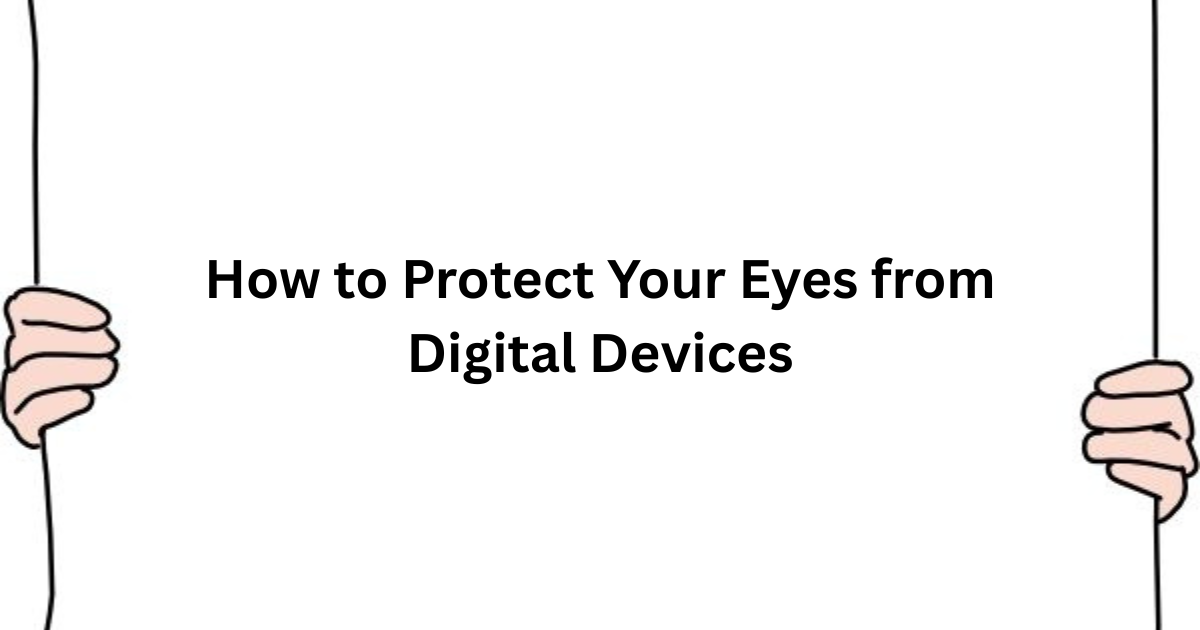We are always on our screens. From checking the time in the morning to watching a movie before bed, our eyes are working non-stop. Phones, laptops, tablets, and even smart TVs are all around us. Our eyes get no rest. That is why it is very important to learn how to protect your eyes in the simplest way.
We often think of screen time as normal. But our eyes are not built to handle this much pressure every single day. Sooner or later, the signs start showing—dryness, irritation, blurry vision, and even headaches. If you relate to any of these, it is time to change a few things.
Why Digital Devices Can Hurt Your Eyes
Screens are not evil. But when you stare at them for hours without a break, your eyes begin to suffer. Most of us do not even notice when we forget to blink. This can lead to dry eyes and discomfort. We keep our faces too close to the screen. We forget to look away. Over time, this adds up.
You may think it’s just tiredness. But eye strain caused by screens is a real thing. Doctors even have a name for it—Digital Eye Strain. It means your eyes are simply overworked. Learning how to protect your eyes from this daily stress is not just smart. It is necessary.
Tip 1: Try the 20-20-20 Rule
This one is super easy. Every 20 minutes, look at something 20 feet away for 20 seconds. That’s it. Just give your eyes a short break. This lets them refocus and relax. It’s one of the best ways to protect your eyes during long hours of screen time. You can set a timer if you forget. Over time, it will become a habit.
Tip 2: Keep Your Screen at the Right Distance
Here’s something simple that many people get wrong. If your screen is too close, your eyes have to work harder. Keep your phone or laptop at least an arm’s length away. Also, place it slightly below eye level. This helps reduce the strain and also improves your posture. You are not only trying to protect your eyes but your whole body.
Tip 3: Adjust Brightness and Font Size
This is one tip that is often ignored. If your screen is too bright, your eyes will get tired fast. If it is too dim, they will have to focus harder. Match the brightness with the lighting in your room. Increase the font size if you find yourself squinting. A small setting change can really help protect your eyes in a big way.
Tip 4: Blink More Often
Blinking is something we do without thinking. But when we stare at screens, we blink a lot less. That is one reason our eyes get dry and itchy. Make a habit of blinking more often. It keeps your eyes moist and comfortable. Even if it feels weird at first, do it anyway. It is a small step to protect your eyes from dryness.
Tip 5: Use Blue Light Filters
Most screens give off blue light. This can be harsh on your eyes and also disturb your sleep. Use the night mode or blue light filter on your device. You can also buy glasses with blue light protection. These filters are especially helpful if you work at night. They are not a cure, but they do help protect your eyes from long-term damage.
Tip 6: Clean Your Screens Often
You may not think of this, but a dirty screen can make your eyes strain more. Dust and smudges reduce clarity. This forces your eyes to work harder. Wipe your screen with a soft cloth regularly. It is a small task but does help to protect your eyes by making things easier to see.
Tip 7: Drink Water and Eat for Your Eyes
Your eyes need moisture to stay healthy. That means drinking enough water every day. Also, eat foods that are good for your eyes. Carrots, spinach, sweet potatoes, almonds, and even oranges can help. These foods have vitamins that support eye health. When you eat right, you naturally protect your eyes from inside out.
Tip 8: Avoid Screens Before Bedtime
Using your phone or laptop just before sleeping can harm your eyes and your sleep. The blue light makes it harder for your brain to relax. Try reading a book or listening to calm music instead. Give your eyes a break before bedtime. It is a simple yet powerful way to protect your eyes and sleep better too.
Tip 9: Take Real Breaks
If you work on a computer all day, do not sit there for hours without a pause. Stand up, walk around or even stretch. Your eyes need that break. A few minutes away from the screen every hour is great. It boosts your focus and helps protect your eyes from getting overworked.
Tip 10: Use Eye Drops (If Needed)
If you already feel the dryness or irritation often, ask your doctor if you need artificial tears. These eye drops can help keep your eyes comfortable. But only use them if you are advised to. They are not always needed but can be a part of your plan to protect your eyes in a tech-heavy life.
Tip 11: Reduce Screen Glare
If light from your window or bulb reflects on your screen, it creates glare. This can make it harder for your eyes to focus. Use anti-glare screens or adjust your light sources. A glare-free screen is much easier to look at and helps protect your eyes from strain during long usage.
Tip 12: Get Your Eyes Checked Every Year
You may not feel any problem now, but regular eye check-ups are a must. Eye doctors can spot early signs of damage or dryness. They can also guide you on the best lenses or habits. If you wear glasses, your power might change due to constant screen use. Getting your eyes tested helps you protect your eyes with the right tools.
Final Thoughts
We live in a world full of screens. That is not going to change. But what can change is how we take care of our eyes. The steps are simple. Look away, blink often, adjust your screen and take short breaks. Eat well and stay hydrated. These are not big changes. But they make a huge difference.
If you care about your eyes, start now. The earlier you build these habits, the better it is for your future. Your eyes deserve rest and care. Do not wait for them to shout for help.


